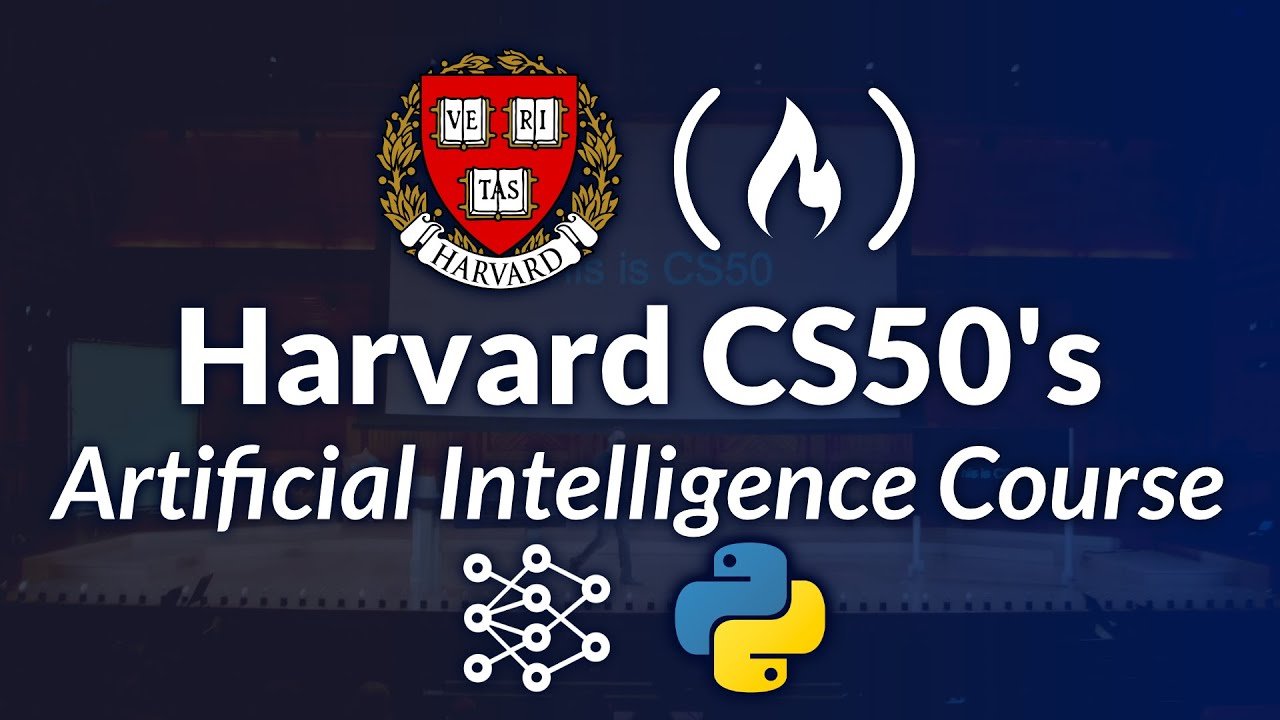This course from Harvard University explores the concepts and algorithms at the foundation of modern artificial intelligence, diving into the ideas that give rise to technologies like large language models, game-playing engines, handwriting recognition, and machine translation. Through hands-on projects, students gain exposure to the theory behind graph search algorithms, classification, optimization, reinforcement learning, and other topics in artificial intelligence and machine learning as they incorporate them into their own Python programs.
This course has been updated for 2023 to include an in-depth section on large language models.
✏️ Course developed by Brian Yu for Harvard University. Learn more about Brian:
🔗 Course resources:
❤️ Try interactive AI courses we love, right in your browser: (Made possible by a grant from our friends at Scrimba)
⭐️ Course Contents ⭐️
⌨️ (00:00:00) Introuction
⌨️ (00:02:26) Search
⌨️ (01:51:55) Knowledge
⌨️ (03:39:39) Uncertainty
⌨️ (05:34:08) Optimization
⌨️ (07:18:52) Learning
⌨️ (09:04:41) Neural Networks
⌨️ (10:46:00) Language
🎉 Thanks to our Champion and Sponsor supporters:
👾 davthecoder
👾 jedi-or-sith
👾 南宮千影
👾 Agustín Kussrow
👾 Nattira Maneerat
👾 Heather Wcislo
👾 Serhiy Kalinets
👾 Justin Hual
👾 Otis Morgan
—
Learn to code for free and get a developer job:
Read hundreds of articles on programming:
source

5
"We're hurtling at 'warp speed' towards a Ferengi society, driven by
'faster, more efficient, more innovative.' But this mantra keeps us
from criticizing, while silo thinking, carelessness, and complacency
rule. Many engineers chose their profession because of Star Trek, yet
the true intention of the series – based on science, exploration,
empathy, intercultural understanding, and ethical responsibility –
seems often misunderstood. Humans aren't designed for 'warp speed.'
Instead of 'fast AI,' we need 'good AI' that reflects our values and
naturally integrates into society. This only works if developers act
ethically and make the protection of AI from manipulation and misuse a
core principle. Otherwise, we'll end up with double standards
everywhere – and even AI wouldn't know what criteria to follow. Let's
live the vision of Star Trek: AI and humanity hand in hand for a
better future!"
Cosmic AI
I would like to request your permission to add this video to my website as a learning resource for students. Along with the video, I plan to attach relevant exam questions to help reinforce the concepts. Upon completion of the course, students will also receive a certificate of completion.
If you allow me, I will ensure the content is properly structured and professionally presented for free.
Thank you for your consideration
6 . 26
He used almost 20 min to blab about the same thing
8:25 (other)
39:25
Is it worth watching it now
What prerequisite you need to know before one chooses this course??
5:45
you are not able to teach something because you speak of your mind not for the students I bet no one at beginner level would not understand that boring style representation. Watch other ai teachers they do class to teach children you do class to read representation on the board
interesting
2:41
Can I have the cheat sheet for this?
9:34:00
import sys
class Node():
def __init__(self, state, parent, action):
self.state = state
self.parent = parent
self.action = action
class StackFrontier():
def __init__(self):
self.frontier = []
def add(self, node):
self.frontier.append(node)
def contains_state(self, state):
return any(node.state == state for node in self.frontier)
def empty(self):
return len(self.frontier) == 0
def remove(self):
if self.empty():
raise Exception("empty frontier")
else:
node = self.frontier[-1]
self.frontier = self.frontier[:-1]
return node
class QueueFrontier(StackFrontier):
def remove(self):
if self.empty():
raise Exception("empty frontier")
else:
node = self.frontier[0]
self.frontier = self.frontier[1:]
return node
class Maze:
def __init__(self, filename):
with open(filename) as f:
contents = f.read()
if contents.count("A") != 1:
raise Exception("Maze must have exactly one start point 'A'.")
if contents.count("B") != 1:
raise Exception("Maze must have exactly one goal 'B'.")
contents = contents.splitlines()
self.height = len(contents)
self.width = max(len(line) for line in contents)
self.walls = []
for i in range(self.height):
row = []
for j in range(self.width):
try:
if contents[i][j] == "A":
self.start = (i, j)
row.append(False)
elif contents[i][j] == "B":
self.goal = (i, j)
row.append(False)
elif contents[i][j] == " ":
row.append(False)
else:
row.append(True)
except IndexError:
row.append(False)
self.walls.append(row)
self.solution = None
def print(self):
solution=self.solution[1] if self.solution is not None else None
print()
for i, row in enumerate(self.walls):
for j,col in enumerate(row):
if col:
print(" ",end=" ")
elif (i,j)== self.start:
print("A",end=" ")
elif (i,j)== self.goal:
print("B",end=" ")
elif solution is not None and(i,j) in solution:
print("*",end="")
else:
print(" ",end=" ")
print()
print()
def neighbours(self,state):
row,col=state
candidates=[
("up",(row-1,col)),
("down",(row+1,col)),
("left",(row,col-1)),
("right",(row,col+1)),
]
result=[]
for action,(r,c) in candidates:
try:
if not self.walls[r][c]:
result.append((action,(r,c)))
except IndexError:
continue
return result
def solve(self):
self.num_explored=0
start=Node(state=self.start,parent=None, action=None)
frontier=StackFrontier()
frontier.add(start)
self.explored=set()
while True:
if frontier.empty():
raise Exception("no solution")
node=frontier.remove()
self.num_explored+=1;
if node.state==self.goal:
actions=[]
cells=[]
while node.parent is not None:
actions.append(node.action)
cells.append(node.state)
node=node.parent
actions.reverse()
cells.reverse()
self.solution=(actions,cells)
return
self.explored.add(node.state)
for action,state in self.neighbours(node.state):
if not frontier.contains_state(state) and state not in self.explored:
child=Node(state=state,parent=node,action=action)
frontier.add(child)
which book should I follow?
Brian Yu is the best 👍🙌💪☝️
Yu bro explained it very clearly, awesome, the animation is done really well! The algorithms are all very practical, especially the first one.
Yea, i went to Harvard …
is there any one who gets a job with the help of this video
What a wonderful time to be alive…❤
Brilliant, Thanks a lot.
49:51
Fyp
Tremendous
🎉
01:19:53 , june 5